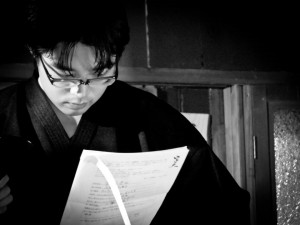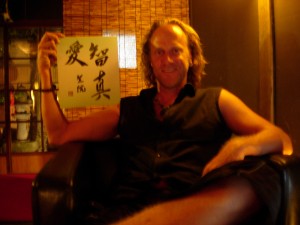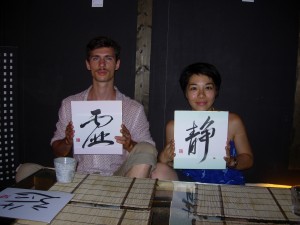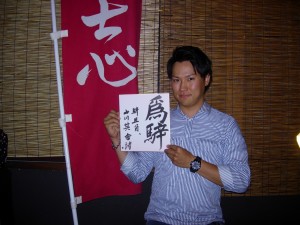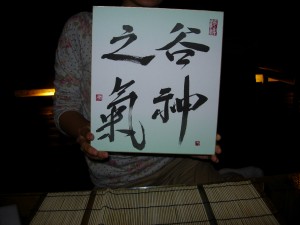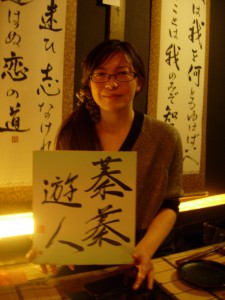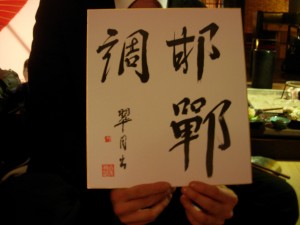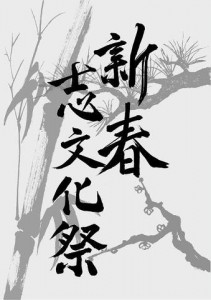2014年2月24日(月)、京都烏丸御池の「Samurai Cafe & Bar SHISHIN(士心)」にて字天ナイトを開催いたしました。
当日のライブの、活動報告です。
今回の字天ナイトもまた書家の八木翠月先生にご臨席いただき、小田の「新ことば」を即興で書にしたためていただきました。
今回「新ことば」をお送りしたのはMariaさんです。MariaさんはSwedenのGothenburgで生まれ、現在はSydneyに在住のnutritionistです。
本文は、Mariaさんにお送りしたレターに従って、英語で掲載いたします。
—————————
On February 24 we gave Maria-san our kanji calligraphy.
It is “瀛志”.
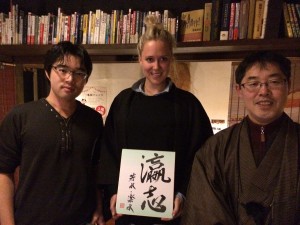
She said that it was the first trip to East-Asian region, and she chose to stay Japan for a week.
I asked “How is your impression for Japan, compared with Western countries such as Australia?”.
She replied “I pick up two points. Firstly, they are patient people. Secondly, they are respectful for strangers.”
I’m so glad she had a good impression for my home country.
She told me that she preferred water because her zodiac sign is ‘the fish’.
Water nourishes lives, so it is praised by ancient East-Asian philosophers such as Lao-zi and Confucius.
Maria-san hoped us to give you some complex kanji characters for tonight.
We tried to create a piece for her memory to visit Samurai Café & Bar Shi-shin, according to the conversation between her and us.
I picked up two kanji characters – 瀛(Ei) & 志(shi).
The first kanji is 瀛 … What a complex and unfamiliar character it is! Even native staff of Shi-shin didn’t know how it pronounced, much less its meaning.
It is one of characters that indicate Japan.
Its origin dates back to an ancient Chinese legend.
Once upon a time Chinese people believed that in the east of the sea there lied three sacred islands where ‘Shinsen (神仙)’ lived. ‘Shinsen’ are legendary hermits who have eternal lives and have supernatural powers. In their imagination they called these islands as “蓬莱 (Horai)”, “方丈 (Hojo)”, and “瀛洲 (Eishu)”.
Some ages passed.
Chinese people knew that there is really an archipelago east of the sea. And people living there came to China and they knew each other. People started to use one name of three legendary islands as a beautiful title of this long archipelago. After that Japan is also called “瀛洲 (Eishu)”, whose meaning is literally ‘land of Ei’. It is an old title for Japan and nowadays seldom used, but because of that it is special and fascinating, isn’t it?
The kanji character 瀛 itself has to do with water because it indicates a legendary island floating on the east of the sea.
A kanji character can be divided into some parts. As for 瀛, it can be divided into the left part ‘シ’ and the residual right. The left part ‘シ’ indicates that the meaning of its character has a connection with water – such as 海 (meaning ‘the sea’ ), 涙 (meaning ‘the tears’), or 湖 (meaning ‘the lake’). And the residual right part indicates how it is pronounced. The kanji system as such somewhat resembles ancient Egyptian Hieroglyphs or Mesoamerican scripts. They are gone but kanji still survives in the modern world, so it is unique.
The second kanji is 志 … Yes, it is the symbolic character of Samurai Café & Bar Shishin.
Shishin is written as 士心. 士 means officers, especially Japanese samurais in the historical connotation. 心 means a heart / sprit. So 士心 (Shishin) can mean Samurais’ spirit.
士 and 心 can merge into one character and create 志. It is also one of kanji characters’ interesting properties. Two or more characters sometimes merge into one and create a new kanji. The meaning of 志 can be roughly said as an ambition, a will, or also a spirit.
I picked up two kanji characters for a memory of visiting Japan, Kyoto in Japan, and Samurrai Café & Bar Shishin in Kyoto.
瀛志 (Ei-shi) – That is, Japan’s spirit.
—————————————–
《About 若水・樂水》
I add two phrases as the appendix to the left side.
They are picked up from two East Asian classics – Lao-zi (老子) and Confucius’ Analects(論語), both of that refer to the virtue of water.
若水 (Mizu no gotoshi)
This phrase is quoted from Lao-zi, the book of Taoism.
It says,
-上善若水。 (Jozen wa mizu no gotoshi.)
It means “The supreme virtue is like water.”
Why?
Its answer is the core of Taoism philosophy, so difficult to explain plainly.
But trying to put it, water always has a tendency to fall down to the lowest level, and finally gathers itself to the great sea. So Lao-zi teaches, we think, not to boast but to be modest, and that can lead a person to the greatest in the end.
樂水 (Mizu o tanoshimu)
This phrase is quoted from Confucius’ Analects, the book of Confucianism.
It says,
-知者樂水。 (Chisha wa mizu o tanoshimu.)
It means “wise persons would enjoy waterside.”
Confucius explains why they do so, saying “ because wise persons are fond of moving things”.
Its meaning is that, we think, as follows:
Wise persons are good at speculating how things change as time goes, on the other hand water always flows and changes as time goes. So they are attracted by water.
Two philosophers’ words about water are profound.
「新ことば」Live字天ナイト at Samurai Cafe & Bar SHISHINは、来月も開催する予定です。
またとない体験を、皆さんもどうかお試しください。初見の方、大歓迎です!
